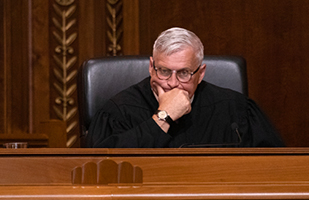Career Examining Laws Begins With Family Business

Second District Judge Ronald Lewis hears his first Supreme Court cases.

Second District Judge Ronald Lewis hears his first Supreme Court cases.
Second District Court of Appeals Judge Ronald C. Lewis has been delving into legal issues for 30 years. His first duty as an attorney was helping the family business his grandfather started in excavation.
“I began working in ditches when I was 13,” said Judge Lewis. “A lot of the projects developed water and sewer lines through municipal and state contracts. Early on, I saw how much enforcement there was with the building codes and laws. I was always fascinated how those legal interpretations affected the business.”
Judge Lewis counseled businesses and families as a private attorney. He represented various clients including individuals, municipalities, and agencies on a local, county, and state level. His work combined prosecution, defense, and appeals cases. He became the law director in Xenia and city prosecutor representing 15 different law enforcement agencies.
“All those responsibilities elevated my understanding and skills as an attorney because who and what you’re defending varies. As an advocate of people, we must show that we care and are working to help someone through a legal issue. When representing a community or agency, we look to the law for accountability,” said Judge Lewis.
He took that perspective to the bench, first as a Xenia municipal judge and in January 2022, he was appointed to serve on the Second District Court of Appeals.
Judge Lewis recently heard his first oral arguments as an assigned judge on the Supreme Court of Ohio. He sat for Justice Joseph T. Deters, who recused. The Ohio Constitution gives the chief justice authority to select an appellate judge to sit for a Supreme Court case when there is a justice recusal.
His assignment included three cases. The first case, State v. FirstEnergy Corp., Randazzo, et al., examined if the state properly seized the property of the former public utilities commission chair. The second case, Disciplinary Counsel v. Hunter, involves a former judge who was convicted of a felony and is challenging a proposed indefinite suspension from the practice of law. And the third case, State v. Toran, examines whether an officer’s search of a truck after a traffic stop was constitutional.
Judge Lewis sifted through case files, examined legal claims, and asked questions during oral arguments to unearth more details. It’s a thorough process that Judge Lewis stated is needed to apply the law and deliver a decision.
Understanding the arguments of the opposing parties can be a challenge, Judge Lewis noted. He said he presses the attorneys for more information so that he can thoroughly grasp their positions.
“That’s why you keep digging,” he said.
Judge Lewis emphasized the significance of the cases coming before the Supreme Court, and the importance of the Court’s decisions.
“You’re in a position to provide order and accountability for everyone in the state” said Judge Lewis.


